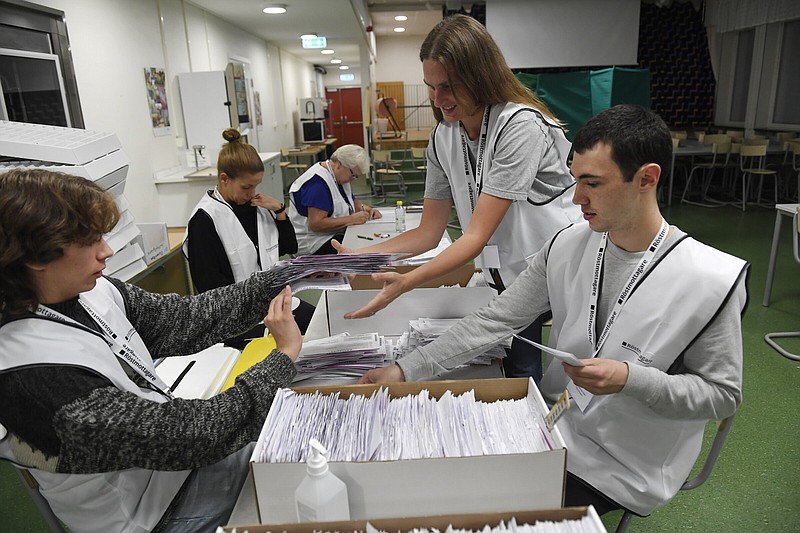STOCKHOLM -- Near final results in Sweden's election Sunday show that a bloc of right-wing parties was expected to defeat a left-wing bloc headed by Prime Minister Magdalena Andersson. The conservative group includes a populist anti-immigration party that made its best ever showing.
However, the result was so close that the election authority said it would not be known before Wednesday when some uncounted votes, including those cast abroad, have been tallied.
According to the early count, Andersson's ruling left-wing Social Democrats won 30.5% of the vote, more than any other party. However a bloc of four left-wing parties appeared to fall short as a whole of winning a majority of votes in the 349-seat parliament, or Riksdag.
Exit polls had initially predicted a narrow victory for Andersson's camp but as the evening wore on, and the vote count supplanted the exit poll, the results tipped in favor of the conservatives.
Early today, the conservatives appeared to have 176 seats to 173 for the center-left.
In a speech to her supporters, Andersson said that while the results were unclear, it was obvious that the social democratic movement, which is based on ideals of creating an equal society and a strong welfare state, remains strong in Sweden.
The biggest winner of the evening was the populist anti-immigration party, the Sweden Democrats, which had a strong showing of nearly 21%, its best result ever. The party gained on promises to crack down on shootings and other gang violence that have shaken a sense of security for many in Sweden.
It has its roots in the white nationalist movement but years ago began expelling extremists. Despite its rebranding, voters long viewed it as unacceptable and other parties shunned it. But that has been changing.
Mainstream parties have been growing increasingly opposed to migration and have been vowing a tougher law-and-order stance in response to crime.
Andersson, a 55-year-old economist, enjoys high approval ratings. She became Sweden's first female prime minister less than a year ago and led Sweden's historic bid to join NATO following Russia's invasion of Ukraine in February.
The poll projected that the center-right Moderate party was projected to win 18.8%. The party leads the conservative opposition bloc under its leader, Kristersson. He ran on a pledge of "Sweden needs change."
During the campaign, Andersson voiced alarm at the rising popularity of the Sweden Democrats, characterizing it as a far-right party that could erode Sweden's identity as a place of tolerance.
Tobias Andersson, a 26-year-old member of parliament for the Sweden Democrats seeking a second term, said his party was unfairly characterized as racist by opponents.
"I wasn't even born when my party was founded, I don't really care who founded it. I look at the values and policies that we support today," he told the AP.
He said politicians who have called his party racist are now "pushing forward the same policies themselves."
Most Swedes still oppose the Sweden Democrats, and some voted tactically against any right-wing party to prevent that faction from getting a chance to wield power.
Voting in Stockholm, Bjarne Frykholm, a 65-year-old computer specialist wouldn't say who he voted for other than to make it clear he opposed the Sweden Democrats.
"I don't want them to get any power at all," he said. "I think they frighten me a lot."
Information for this article was contributed by Jari Tanner and James Brooks of The Associated Press.

